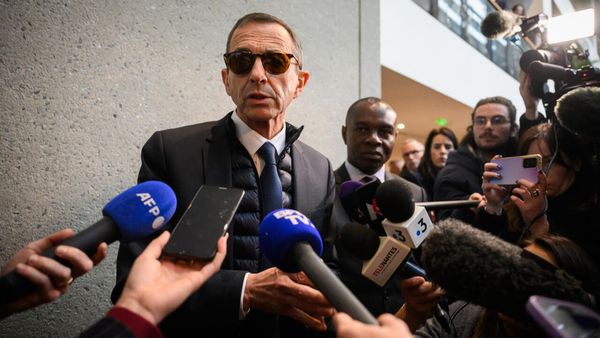When an attractive, US army doctor working in Afghanistan sent a sweet hello message to Chamanun Phetporee on LinkedIn, she was so intrigued she wrote back.
As the chief financial officer (CFO) of a multinational company's Thailand branch, Chamanun had little time for love, but something about "Dr Andrew Chang" reeled her in.
That initial, brief exchange was the first of tens of thousands of messages and, at the age of 50, Chamanun thought she had finally found her soulmate.
It would take her months to realise the man she thought was "the one" had actually ensnared her in the biggest romance scam in Thailand's history.
That fateful LinkedIn message marked the beginning of a tangled web of lies that would ultimately lead to Chamanun stealing 6.2 billion baht ($250 million) from her employer, and potentially facing the rest of her life behind bars.
Twenty-two people have been arrested as part of the scam, and there are warrants out for another eight people.
How a fake LinkedIn profile was used to lure in single women
Using a fake LinkedIn profile with a stolen photo, the scammer added Chamanun and introduced himself as Dr Andrew Chang.
Lieutenant Colonel Korkiat Wuthijumnong of the Royal Thai Police's Central Investigation Bureau explained the photo actually belonged to "an innocent person in Malaysia".
"[The scammer] claimed he was a doctor posted in Afghanistan, his wife had passed away a long time [ago], he had one daughter like six or seven years old, he came from a wealthy family, and he would like to retire in Thailand after he finishes his contract in Afghanistan," he said.
Lieutenant Colonel Korkiat said it was likely the scammer told the same story to many women, but Chamanun took the bait because she was lonely.
"She was a quiet person, the main focus for her was work and work and work," he said.
After a few exchanges through LinkedIn, 'Dr Andy' and Chamanun were soon messaging back and forth on WhatsApp every night for hours.
'Dr Andy' said he could not speak on the phone or video call because he was either too busy or the internet quality was terrible in Afghanistan, but she was not put off by those excuses.
"She 100 per cent thought she had found true love," Lieutenant Colonel Korkiat said.
"For the whole case we extracted more than 50,000 WhatsApp messages."
The elaborate plot to steal funds from Chamanun's employer
About two months into their online relationship the scammer asked Chamanun for help finding a house in Thailand.
'Dr Andy' told her he would like to transfer an inheritance from his late father, worth $US58 million ($85 million), to Thailand and use some of the money to buy a luxury home for himself and Chamanun to move into.
Chamanun found them a home, but when it came time to put the deposit down 'Dr Andy' said he was having trouble transferring the money out of a Swiss bank account, so he asked her if she could pay the deposit and he would pay her back.
At that stage Chamanun was a little suspicious, but her concerns were allayed when the scammer arranged to have his father's death certificate sent to her from England where he had died.
"It was a fake document but it came from England, so she was like 'wow'. She wouldn't know what a real one looked like, it looked real and it was posted from the UK," Lieutenant Colonel Korkiat said.
Having put Chamanun's fears at ease, the scammer moved on to the next stage of his plan.
WhatsApp messages between the pair revealed the scammer told her he needed more money to pay for other expenses related to transferring his large inheritance to Thailand.
She said she did not have any money left after paying for the house deposit, so he convinced her to "borrow" the money from her company, Essilor Manufacturing Thailand.
At first, Chamanun refused, telling 'Dr Andy': "We shouldn't do that, I cannot do that.'"
"But finally he convinced her because he said, 'come on I love you … and when the money from the inheritance comes to Thailand, we can pay it back and nobody will know [because] you are the CFO of the company," Lieutenant Colonel Korkiat said.
Over the next three months Chamanun used fake invoices and false accounting entries to make 251 transfers to 112 bank accounts in 17 countries.
Whenever she raised fresh doubts about the whole scenario, the scammer would up the ante.
"He forced her to believe, and when she would think 'this doesn't make sense', love would come and sweet words would come to convince her," Lieutenant Colonel Korkiat said.
The scammer also started involving other people in the con.
At one point a friend of the so-called army doctor messaged Chamanun to say 'Dr Andy' had a heart attack in Afghanistan and needed money for treatment.
Another associate sent her a bank account link where she could log on and see all the money she had sent, but police later discovered it was a fake website with just one letter in the web address different to that of the real bank.
Chamanun was also convinced to fly to Malaysia twice to meet a "lawyer" handling 'Dr Andy's' affairs.
On the first occasion the lawyer took her to a fake office, then to a room where there was a pile of cash said to be the doctor's inheritance.
"They brought her upstairs, then she saw a big suitcase and there were billions of baht, all in US currency and she was like 'wow, that is real money'," Lieutenant Colonel Korkiat said.
"They gave her a $100 bill, saying 'you can check it, it is a real one' and she kept it, but we believe the rest were probably fake."
Chamanun went back home and continued to transfer the money to various bank accounts, unaware that her employer was becoming suspicious.
Dozens of transfers raise company's suspicions
Chamanun had been transferring money out of Essilor Manufacturing Thailand's accounts for about four months when the company discovered fraudulent fund transfers exceeding $250 million.
The company, which makes optical lenses, hired private investigators to track down the funds, and Chamanun was eventually confronted with pages and pages of evidence.
When she could not explain the transactions, she confessed to theft, prompting the company to take the case to police.
"At that time we believed she was probably one of the gang," Lieutenant Colonel Korkiat said.
But he added that after police did some more digging "and looked into every angle", they found that while she had committed crimes, she was also a victim.
"She did not know anything about the scammers at all," he said.
Essilor Manufacturing Thailand told the ABC these are "ongoing proceedings and as such the company is unable to comment at this time".
"Essilor is pursuing its efforts with on-going actions to recover the misappropriated funds, and is actively cooperating with the judicial and local law enforcement authorities in their investigations," the statement said.
Police trace elaborate scam back to Nigeria
Romance scammers are very skilled at exploiting people's weaknesses, Lieutenant Colonel Korkiat said.
"These criminals study their victims, they work hard, they are educated, they understand social media, they have created a good template [for messages], they know technology, and they understand how to transfer money to other countries," he said.
"Anyone can be a victim, the scammers are really good."
When Chamanun was first interviewed by police, she did not believe that her six-month relationship with 'Dr Andy' was a lie.
"She cried a lot, her whole world was breaking down," Lieutenant Colonel Korkiat said.
"I explained to her step by step [how] this was the modus operandi of a romance scam case … but she couldn't believe it. We had to say it for many days."
The detective added that when he took her through all the transactions she was stunned at what she had done.
She cooperated fully with police as they tried to then identify the network of scammers who had conned her.
After looking through all the WhatsApp messages, identifying the owners of the bank accounts she sent money to, and then looking at those account holders' social media accounts, police began to close in on the scammers.
Twenty-two of the suspected network of 30 are now behind bars.
Detectives were able to trace the scam back to Nigeria, but found it also had people working in several countries, including Thailand, Malaysia, England, the United States and even Australia.
Chamanun was eventually arrested in March 2020.
She was charged with 251 counts of theft from an employer and faced up to four years in jail for each offence.
Since she was also a victim of crime and had cooperated with the investigation, a judge sentenced her to only two years per offence.
It added up to 502 years in jail, but Chamanun will serve a maximum term of 20 years because she will serve some of the sentences concurrently.
Chalidaporn Songsamphan, a professor of gender and politics at Thailand's Thammasat University, said there was lot to learn from this case.
"So many people find their partners online … especially when you are getting older and you want to find romantic love and a relationship, so that is a kind of vulnerability," Professor Chalidaporn said.
"If you look at the characteristics of women who become victims of romance scams, many of them are professionals, so many people think they should have known [better].
"But the point I really want to make is when we hear about these kind of stories, stop saying that these people who fall for scams are idiots or stupid, they are not — we are talking about human vulnerability."
Is it too good to be true?
Police have said they fear more and more Thai people are falling victim to these scams, but are too embarrassed to report them.
As the ABC Bangkok bureau was working on this story, one of our Thai staff members happened to receive a WhatsApp message from a suspected scammer, so she engaged with him to see how quickly he would try to lure her in.
'Daniel Williams' said he was a cosmetics entrepreneur from Australia currently living in the UK.
Within days he was calling the ABC's staff member his "honey" and asking about what sort of work she did.
Even though she was vague in her responses, within a week, 'Daniel' wanted to send her $100,000 to go into business together.
The ABC reported the phone number and message details to police, who said the out-of-the-blue contact showed how prolific scammers were across all messaging apps and social media platforms.
Lieutenant Colonel Korkiat urged people to be wary of messages from strangers, and be suspicious of requests to either pay or receive money from people they have never met.
"You must keep asking [yourself], 'Why? Does it make sense? Is it too good to be true?'," he said.
Professor Chalidaporn said authorities around the world also had a part to play in raising awareness about romance scams with specific campaigns and support programs, to reduce the stigma preventing victims from coming forward.
"I believe these romance scams happen all the time but people who experience them do not report them … so the scammers can repeat their crimes over and over again," she said.
"So let's try to take this seriously and instead of looking at this as human stupidity, look at this vulnerable aspect of human beings and what can we do [to help] with that."







